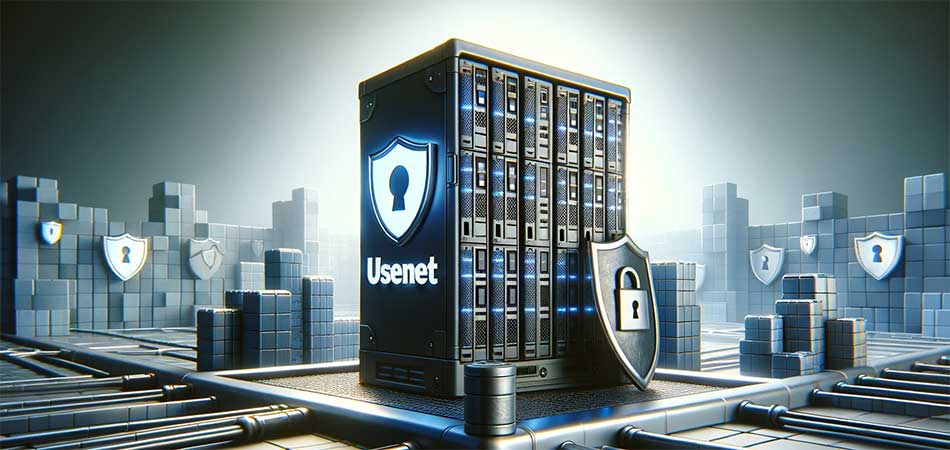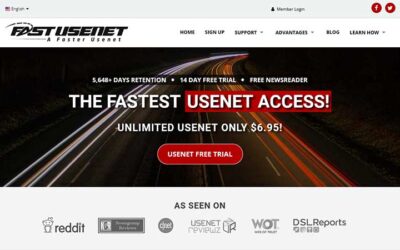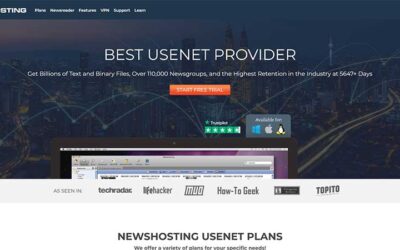Contents
Is Usenet Secure?
Usenet itself is a network protocol that does not inherently include security features such as encryption. However, the security of your Usenet experience largely depends on the provider you choose and the measures you take to protect your privacy. Most reputable Usenet providers offer SSL (Secure Sockets Layer) encryption (see more below), which ensures that the data transferred between your computer and the Usenet servers is encrypted and secure from eavesdroppers.
What is SSL Encryption?
SSL (Secure Sockets Layer) encryption is a standard security technology that establishes an encrypted link between a web server and a browser, or in the case of Usenet, between a user’s client (newsreader) and the Usenet server. This link ensures that all data passed between the two remains private and integral, meaning it cannot be intercepted or tampered with by unauthorized parties.
SSL encryption works by using cryptographic keys to encode the data transmitted over the connection. When a user connects to a server using SSL, their client initiates a handshake process that establishes a secure session. During this process, the server presents a digital certificate to the client, which verifies the server’s identity and establishes a secure, encrypted channel for communication.
How Usenet Providers Utilize SSL Encryption
Usenet providers use SSL encryption to protect users’ privacy and enhance the security of their service. When a user connects to a Usenet server using SSL, their client software and the server establish an encrypted connection before any data, such as newsgroup articles or binary files, is exchanged. This encrypted connection ensures that the user’s activities on Usenet, including which newsgroups they access and what files they download, are hidden from eavesdroppers and potential attackers.
To utilize SSL encryption with a Usenet provider, users typically need to enable SSL in their Usenet client’s settings and connect to a specific SSL-enabled port provided by the provider. The provider’s servers handle the encryption and decryption of data seamlessly, so the user’s experience is largely unchanged, except for the added security benefits.
It’s important to note that while SSL encryption protects the data in transit between the user and the Usenet server, it does not protect the data once it’s stored on the user’s device. Users should still exercise caution when downloading files from Usenet and ensure they have adequate security measures in place on their devices. We recommend having up to date malware or virus scanning software as some files on Usenet aren’t always what they say they are.
Tips to Stay Secure on Usenet
To enhance your security and privacy while using Usenet, consider the following tips:
- Choose a Reputable Provider: Select a Usenet provider that offers SSL encryption and has a good reputation for privacy and security. Check reviews and user feedback to make an informed decision. Providers such as Fast Usenet, UsenetServer, and Newshosting have proven over the years to be outstanding providers.
- Use SSL Encryption: Always enable SSL encryption in your Usenet client settings. This will encrypt your connection to the Usenet server, making it difficult for anyone to intercept or read your data.
- Use a VPN: For an extra layer of security, consider using a Virtual Private Network (VPN) when accessing Usenet. A VPN encrypts all your internet traffic, not just your Usenet activities, and hides your IP address, providing enhanced privacy and security.
- Be Cautious with Personal Information: Be mindful of the information you share in newsgroups. Avoid posting personal details that could be used to identify or track you.
- Keep Your Software Updated: Regularly update your Usenet client (newsreader) and any other software you use to connect to Usenet. This ensures that you have the latest security patches and features. For more information about newsreaders please visit our newsreader review section.
- Use Antivirus Software: Since Usenet can be a source of malware, it’s important to have reliable antivirus software installed on your computer to scan any files you download.
- Be Wary of Suspicious Content: Exercise caution when downloading files from Usenet. Stick to reputable newsgroups and be skeptical of files that seem too good to be true, as they may contain malware. For example if you see an file that is normally would be Gigabytes in size and is listing in the newsgroup as only 2MB, that is usually a strong indicator that the file is malware.
Conclusion
Usenet can be a secure and private platform if you take the necessary precautions. By choosing a reputable provider such as Fast Usenet or UsenetServer, using SSL encryption, and following best practices for online security, you can enjoy the benefits of Usenet while minimizing the risks. Remember, staying informed and cautious is key to maintaining your security and privacy on Usenet and any other online service.




